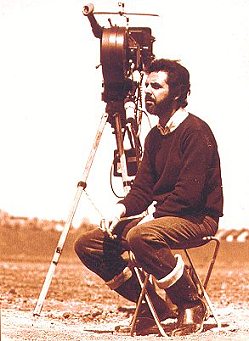
Sohrab Shaheed Salles or Sohrab Shahid-Saless was an Iranian film director and screenwriter and one of the most celebrated figures in Iranian cinema in the 20th century. After 1976 he worked in the cinema of Germany and was an important component of the film diaspora working in the German industry.

Anna Boleyn, also known as Deception, is a 1920 German historical film directed by Ernst Lubitsch. It stars Henny Porten as Anne Boleyn and Emil Jannings as King Henry VIII.
La Mujer de mi vida is a 1998 telenovela co-produced by Venezuelan television company Venevisión in conjunction with the Miami, Florida based production company Fonovideo.

Frieda Ulricke "Henny" Porten was a German actress and film producer of the silent era, and Germany's first major film star. She appeared in more than 170 films between 1906 and 1955.
The Comedians is a 1941 German historical drama film directed by G. W. Pabst and starring Käthe Dorsch, Hilde Krahl and Henny Porten. It is based on the novel Philine by Olly Boeheim. The film is set in the eighteenth century, and portrays the development of German theatre. The film was shot at the Bavaria Studios in Munich with sets designed by the art director Julius von Borsody.

Kohlhiesels Töchter is a 1920 German silent comedy film directed by Ernst Lubitsch and starring Henny Porten, Emil Jannings and Jakob Tiedtke. It is an adaptation of the play Kohlhiesel's Daughters by Hanns Kräly, Lubitsch's frequent collaborator, who also worked on the film's screenplay. Three further film adaptations have been made of the work including a 1930 sound remake which also starred Porten.

The 36th annual Berlin International Film Festival was held 14–25 February 1986. The festival opened with Ginger and Fred by Federico Fellini, which played out of competition at the festival.

Hintertreppe is a 1921 silent film. This was the first movie by German director Leopold Jessner, in cooperation with Paul Leni. Carl Mayer specifically wrote this for Leopold Jessner, who would go on to direct Erdgeist (1923). Hintertreppe was a precursor of the 1920s German kammerspielfilm style.

The Ancient Law is a 1923 German silent drama film directed by E. A. Dupont and starring Henny Porten, Ruth Weyher and Hermann Vallentin. The son of an Orthodox Rabbi faces hostility from his father when he decides to become an actor.

The Merchant of Venice is a 1923 German silent drama film directed by Peter Paul Felner and starring Werner Krauss, Henny Porten and Harry Liedtke. The film is an adaptation of William Shakespeare's play The Merchant of Venice. It was released in the United States in 1926 as The Jew of Mestri. The film was made on location in Venice, with scenes and characters added which were not in the original play. This is the surviving copy, being two reels shorter than the German version. The characters in the German retained Shakespeare's nomenclature, but in the American they were given new names sourced from the Italian work Il Pecorone, a 14th-century short story collection attributed to Giovanni Fiorentino, from which Shakespeare is believed to have drawn his idea. The film purports to be a return to the original, as an excuse for its differences from the play.
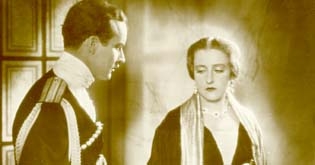
The Mistress and Her Servant is a 1929 German silent drama film directed by Richard Oswald and starring Henny Porten, Mary Kid and Fritz Kampers. It was based on the novel of the same title by Georg Engel. It was shot at the EFA Studios in Berlin. The film's sets were designed by the art director Franz Schroedter.
Franz Porten was a German actor and film director. He was the father of actress and film producer Henny Porten, screenwriter, actress, and director Rosa Porten, and actor Fritz Porten.

Mother and Child is a 1924 German silent drama film directed by Carl Froelich and starring Henny Porten, Friedrich Kayßler, and Wilhelm Dieterle. It was shot at the EFA Studios in Berlin. It was remade in 1934 as a sound film of the same title also starring Porten.

Mother and Child is a 1934 German drama film directed by Hans Steinhoff and starring Henny Porten, Peter Voß, and Elisabeth Wendt. It is a sound remake of the 1924 silent film Mother and Child which had been a major hit for Porten. Franz Schroedter worked as art director on the film.

Louise, Queen of Prussia is a 1931 German historical drama film directed by Carl Froelich and starring Henny Porten, Gustaf Gründgens, and Ekkehard Arendt. The film's art director was Franz Schroedter.

24 Hours in the Life of a Woman is a 1931 German drama film directed by Robert Land and starring Henny Porten, Walter Rilla and Friedrich Kayßler. It is based on Stefan Zwieg's 1927 novella Twenty-Four Hours in the Life of a Woman. The film was produced by Seymour Nebenzal's Nero Film in conjunction with Porten's own production company. It was shot at the Terra Studios in Berlin. The film's art direction was by Franz Schroedter.
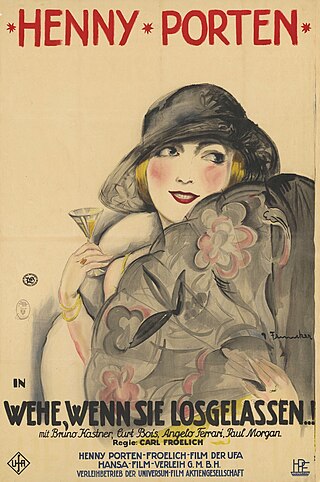
When She Starts, Look Out is a 1926 German silent comedy film directed by Carl Froelich and starring Henny Porten, Bruno Kastner, and Curt Bois. It was shot at the EFA Studios in Berlin. The film's sets were designed by Franz Schroedter. It premiered the UFA-Palast am Zoo.

A Mother's Love is a 1929 German silent drama film directed by Georg Jacoby and starring Henny Porten, Gustav Diessl, and Paul Henckels. It was shot at the Staaken Studios in Berlin and on location in Pomerania. The film's sets were designed by Gustav A. Knauer and Willy Schiller.
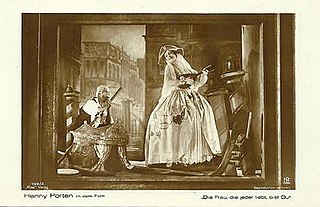
The Woman Everyone Loves Is You is a 1929 German silent film directed by Carl Froelich and starring Henny Porten, Fritz Kampers and Paul Hörbiger. The film's sets were designed by Gustav A. Knauer and Willy Schiller.
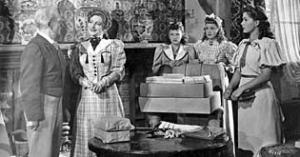
When the Young Wine Blossoms is a 1943 German comedy film directed by Fritz Kirchhoff and starring Henny Porten, Otto Gebühr and René Deltgen. It was based on a play by the Norwegian writer Bjørnstjerne Bjørnson which had previously been adapted into a 1927 German silent film of the same title.

















